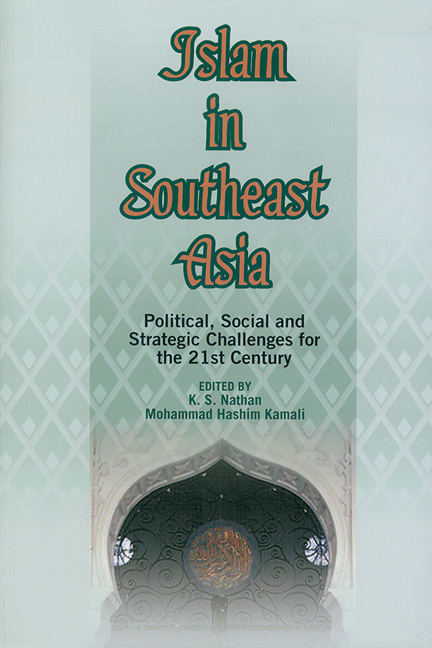Book contents
- Frontmatter
- Contents
- Preface
- Introduction: Understanding Political Islam Post-September 11
- PART ONE ISLAMIC DOCTRINE, HISTORY, GROWTH AND INSTITUTIONS IN SOUTHEAST ASIA
- PART TWO POLITICS, GOVERNANCE, CIVIL SOCIETY AND GENDER ISSUES IN SOUTHEAST ASIAN ISLAM
- PART THREE MODERNIZATION, GLOBALIZATION AND THE ‘ISLAMIC STATE’ DEBATE IN SOUTHEAST ASIA
- 11 Islam and Modernization
- 12 Modernization and the Process of Globalization: The Muslim Experience and Responses
- 13 The Malaysian Constitution, the Islamic State, and Hudud Laws
- 14 The Islamic State: Origins, Definition, and Salient Attributes
- PART FOUR IMPACT OF SEPTEMBER 11 ON ISLAMIC THOUGHT AND PRACTICE
- CONCLUSION: Addressing the Challenge of Political Islam in Southeast Asia
- Note on Contributors
- About the Editors
- Index
14 - The Islamic State: Origins, Definition, and Salient Attributes
from PART THREE - MODERNIZATION, GLOBALIZATION AND THE ‘ISLAMIC STATE’ DEBATE IN SOUTHEAST ASIA
Published online by Cambridge University Press: 03 November 2017
- Frontmatter
- Contents
- Preface
- Introduction: Understanding Political Islam Post-September 11
- PART ONE ISLAMIC DOCTRINE, HISTORY, GROWTH AND INSTITUTIONS IN SOUTHEAST ASIA
- PART TWO POLITICS, GOVERNANCE, CIVIL SOCIETY AND GENDER ISSUES IN SOUTHEAST ASIAN ISLAM
- PART THREE MODERNIZATION, GLOBALIZATION AND THE ‘ISLAMIC STATE’ DEBATE IN SOUTHEAST ASIA
- 11 Islam and Modernization
- 12 Modernization and the Process of Globalization: The Muslim Experience and Responses
- 13 The Malaysian Constitution, the Islamic State, and Hudud Laws
- 14 The Islamic State: Origins, Definition, and Salient Attributes
- PART FOUR IMPACT OF SEPTEMBER 11 ON ISLAMIC THOUGHT AND PRACTICE
- CONCLUSION: Addressing the Challenge of Political Islam in Southeast Asia
- Note on Contributors
- About the Editors
- Index
Summary
INTRODUCTION
This chapter begins with an introductory section which sets out some of the uncertainties concerning the concept and definition of an Islamic state, a brief history of developments, and a literature review. The remaining part of the discussion focuses on the salient attributes of an Islamic state: whether the Islamic state proposes a limited as opposed to a totalitarian government, whether it can be characterized as a civilian state as opposed to a theocracy, and whether it would be justified to characterize the Islamic state as a qualified democracy. The last section of this paper briefly addresses the Islamist demand for the establishment of Islamic state, and some comments on recent developments in Malaysia. What is attempted here is a selective account of some of the characteristic features of an Islamic state and does not claim to be exhaustive.
PREVAILING UNCERTAINTIES
Much of the ambiguity concerning the basic concept of an Islamic state is due to the under-developed state of Islamic constitutional law when it is compared to the private and personal law branches of the shari'a. This was in turn a result of the prevalence of dictatorship and dynastic rule in much of the Islamic history which stifled the natural development of ideas on politics and government. Scholarly attention was consequently focused on matters of worship, matrimonial law, property and inheritance, etc., which are far more developed when compared to constitutional law and government. What is more is that most of what happened in the centuries following the fall of the Righteous Caliphate represented a departure from the normative principles of Islam.
A former Mufti of Egypt, Shaykh Ahmad Huraydi wrote that the political order that prevailed in the Muslim lands from the Umayyad rule down to the end of the Ottomans did not, on the whole, comply with the principles and teachings of Islam. Those who wrote on Islamic government and administration often focused their attention on dynastic practices which did not reflect the Islamic principles of government but mainly expounded the history of government in those times and “there is a huge difference between the two”.
- Type
- Chapter
- Information
- Islam in Southeast AsiaPolitical, Social and Strategic Challenges for the 21st Century, pp. 278 - 298Publisher: ISEAS–Yusof Ishak InstitutePrint publication year: 2005



